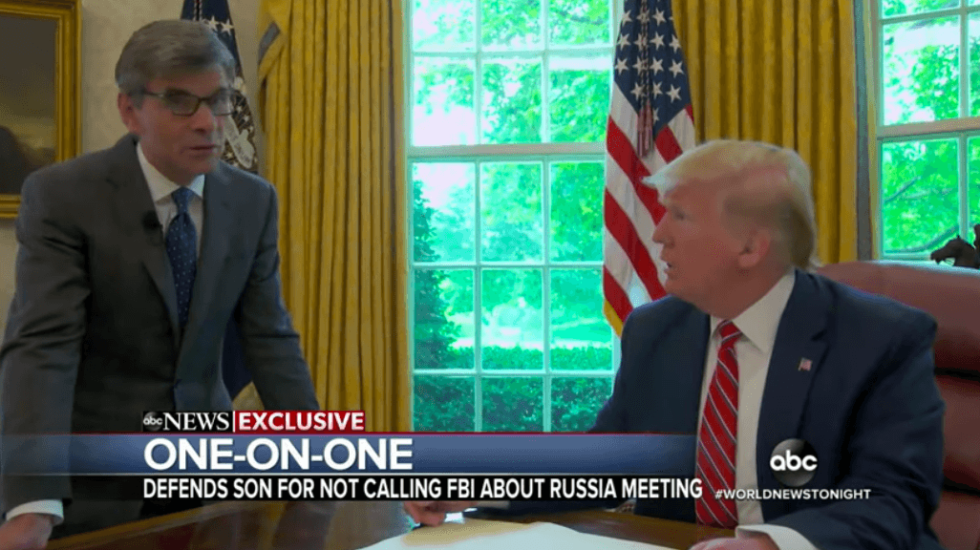When ABC’s George Stephanopoulos asked Donald Trump if he would accept a foreign government’s help to win an election, Trump answered, “I think I’d take it.” Of course he would. The Mueller report demonstrates that his 2016 campaign actually did:
“[T]he investigation established that the Russian government perceived it would benefit from a Trump presidency and worked to secure that outcome, and that the Campaign expected it would benefit electorally from information stolen and released through Russian efforts….” (Vol. I, p. 5)
But Trump’s words became headlines because a 90-second television clip is more powerful than the accumulated evidence in a 448-page report that few people will read:
Like every US intelligence agency, Mueller concluded that the facts pointed in one direction: Putin wanted Trump to win and the Trump campaign embraced Russia’s assistance. And Mueller’s facts are stubborn things:
APR. 18, 2016: Russia has hacked Clinton campaign manager John Podesta’s computer, gained access to Democratic (DNC and DCCC) networks, and is stealing DNC and DCCC documents. (Vol. I, pp. 4, 37-38)
APR. 19: A Russian internet troll farm purchases its first social media ads explicitly endorsing Trump for president — support that continues beyond Election Day. (Vol. I, pp. 25-26)
APR. 26: In London, a Russian intermediary tells Trump adviser George Papadopoulos that Russia has “dirt” on Clinton in the form of thousands of emails. Papadopoulos’ Russia-related communications with top campaign officials continue throughout the spring and summer. (Vol. I, pp. 5-6, 86-92)
JUNE 3: Donald Trump Jr. receives Russia’s offer “to provide the Trump campaign with some official documents and information that would incriminate Hillary…[as] part of Russia and its government’s support for Mr. Trump….” Within minutes, Don Jr. responds: “[I]f it’s what you say, I love it especially later in the summer.” (Vol. I, pp. 112-117)
JUNE 9: At Trump Tower in New York, Don Jr., Jared Kushner, and Paul Manafort meet secretly with three Russians, including a lawyer with Kremlin ties. (Vol. I, pp. 112, 117)
JULY 22: Three days before the Democratic National Convention begins, WikiLeaks disseminates the first batch of stolen Democratic emails that it received from Russian intelligence officers. (Vol. I, pp. 44-46)
JULY 27: At a press conference, Trump says, “Russia, if you’re listening, I hope you’re able to find the 30,000 emails that are missing. I think you will probably be rewarded mightily by our press.” (Vol. I, p. 49)
Less than five hours later, Russian intelligence officers target for the first time Clinton’s personal office. (Vol. I, p. 49)
SUMMER/FALL: The Trump campaign is “planning a press strategy, a communications campaign, and messaging based on the possible release of Clinton emails by WikiLeaks.” (Vol. I, p. 54)
Several pages in Mueller’s report detailing “The Trump Campaign and the Dissemination of Hacked Emails” are heavily redacted. (Vol. I., pp. 51-59)
Call the FBI?
Stephanopoulos reminded Trump that FBI Director Christopher Wray warned candidates to report offers of foreign assistance to the FBI. The Trump campaign never did.
“The FBI director is wrong,” Trump said. “[I]f you go talk honestly to congressmen, they all do it, they always have. And that’s the way it is. It’s called oppo research.”
Actually, it’s called a felony. In a rebuke to Trump, Ellen Weintraub, chair of the Federal Election Commission, tweeted, “I would not have thought that I needed to say this.” Then her attached official statement began, “Let me make something 100% clear to the American public and anyone running for office: It is illegal for any person to solicit, accept, or receive anything of value from a foreign national in connection with a US election.”
The next morning, Trump called into Fox & Friends and tried to walk back his admissions: “Of course you have to look at [“dirt” from a foreign government] because if you don’t look at it you’re not going to know if it’s bad. If I thought anything was incorrect or badly stated I’d report to the FBI or law enforcement, absolutely.” Using Weintraub’s words, Trump’s nonsensical approach would still leave him “on the wrong end of a federal investigation.”
About That Counterintelligence Probe
As Trump invites foreign interference, he stonewalls Congress’ demands for a briefing on the FBI’s counterintelligence probe, which Mueller’s report does not address. Taken together, Trump’s actions heighten a key counterintelligence concern: Whether Putin’s help with Trump’s 2016 campaign or Trump’s business ties to Russia have already compromised him.
In 1788, Alexander Hamilton understood that the “most deadly adversaries of republican government” come “chiefly from the desire in foreign powers to gain an improper ascendant in our councils. How could they better gratify this, than by raising a creature of their own to the chief magistracy of the Union?” (Federalist No. 68)
Hamilton posed a rhetorical question. In 2016, Trump made it real. As the 2020 election approaches, he has made it urgent.
This is the tenth in a series of posts by Steven J. Harper on the Mueller report. The first nine installments are available here, here, here, here, here, here, here, here, and here. Steve is the creator and curator of the Trump-Russia Timeline appearing at Dan Rather’s News & Guts and at Just Security. He’s an attorney, adjunct professor at Northwestern University Law School, and author of four books, including Crossing Hoffa — A Teamster’s Story (Chicago Tribune “Best Book of the Year”) and The Lawyer Bubble — A Profession in Crisis. He blogs at The Belly of the Beast. Follow him on Twitter (@StevenJHarper1).



